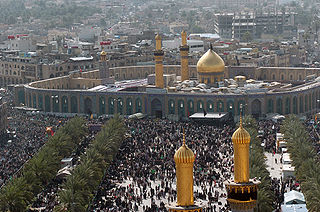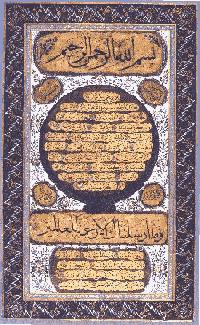Related Research Articles

Names of God in Islam are names attributed to God in Islam by Muslims. Some names are known from either the Qur’an or the hadith, while others can be found in both sources, although most are found in the Qur’an.
Al-Falaq or The Daybreak is the 113th chapter (sūrah) of the Qur'an. It is a brief five ayat (verse) surah, asking God for protection from evil:
Ar-Ra'd,, or the Thunder, is the 13th chapter (sūrah) of the Qur'an, composed of 43 verses (āyāt). It has Muqattat المر.
ʿAbd Allāh ibn ʿAbbās, also known as Ibn ʿAbbās, was one of the cousins of the Islamic prophet Muhammad. He is considered to be the greatest mufassir of the Qur'an.
The Throne Verse is the 255th verse of the 2nd chapter of the Quran, Al-Baqara (Q2:255). In this verse, God (Allah) introduces himself to mankind. God tells us how nothing and nobody is regarded to be comparable to God.

In Islam, angels are believed to be heavenly beings, created from a luminous origin by God (Allah). The Quran is the principal source for the Islamic concept of angels, but more extensive features of angels appear in hadith literature, Mi'raj literature, Islamic exegesis, theology, philosophy, and mysticism.
The Saved Sect, formerly and more generally known as The Saviour Sect, is an Islamist organization that operated in the United Kingdom from its formation in November 2005 until the British government proscribed it on 17 July 2006. It is widely believed, along with Al Ghurabaa, to be the reformed Al-Muhajiroun which Omar Bakri Muhammad disbanded in 2004. It is believed that Omar Bakri today still heads this organisation.

Abū al-ʻAbbās Ahmad ibn Muhammad at-Tijāniyy or Ahmed Tijani, was an Algerian Sharif who founded the Tijaniyyah tariqa.

Imāmah means "leadership" and is a concept in Twelver theology. The Twelve Imams are the spiritual and political successors to Muhammad, the Prophet of Islam, in the Twelver branch of Shia Islam. According to Twelver theology, the successors to Muhammad are infallible human beings, who rule justly over the community and maintain and interpret sharia and undertake the esoteric interpretation of the Quran. The words and deeds of Muhammad and the Imams guide the community. For this, the Imams must be free from error and sin and chosen by divine decree—nass—through the Prophet.

Ramadan is the ninth month of the Islamic calendar, and the month in which the Quran is believed to be revealed to the Islamic prophet Muhammad.
Umayr ibn Sa'd al-Ansari was a companion of Muhammad. His father died when Umayr was young, leaving him and his mother poor and destitute. His mother eventually remarried to one of the richest men in Medina, Julas ibn Suwayd from the powerful tribe of al-Aws. When he was barely ten years old, Umayr became a Muslim and was known to frequent the mosque despite his young age. In 630 Muhammad announced his intention to lead an expedition to Tabuk against the Byzantine forces. He ordered the Muslims to make the necessary preparations.

In Islam, God is seen as the creator and sustainer of the universe, who lives eternally and will eventually resurrect all humans. God is conceived as a perfect, singular, immortal, omnipotent, and omniscient god, completely infinite in all of his attributes. Islam further emphasizes that God is most-merciful. The Islamic concept of God is generally described as monotheistic, and also as panentheistic in Islamic mystical teachings.
Salat al-Istikhaara, which translates to Prayer of Seeking Counsel, is a prayer recited by Muslims who are in need of guidance from God Almighty (Allah) when facing a decision in their life. The prayer, known as salah in Arabic is performed in two units of prayer or raka'ah followed by the supplication of Salat al-Istikhaara.

Istighfar, is the act of seeking forgiveness from God, usually by saying ʾastaġfiru -llāha. A longer variant is ʾastaġfiru -llāha rabbī wa-ʾatūbu ʾilayhi which means "Verily, I seek the forgiveness of God, who is my Lord and Sustainer, and I turn to Him in repentance". It is considered one of the essential parts of worship in Islam.
Abdullah ibn Umm-Maktum was, according to Ibn Kathir (d.1373), a companion of Islamic prophet Muhammad. In some traditions his name has also appeared as `Amr ibn Umm-Maktum. The first verses of He Frowned, the 80th chapter of Qur'an, are considered to be revealed in an incident connected to him.

Al-Kāfirūn is the 109th chapter (sūrah) of the Quran. It has six ayat or verses as follows:
Certain verses (āyāt) from the Qur'an have been a subject of controversy among scholars. The 216th verse of the Surah, Al-Baqara is about Jihad in the way of God.
كُتِبَ عَلَيْكُمُ ٱلْقِتَالُ وَهُوَ كُرْهٌ لَّكُمْ ۖ وَعَسَىٰٓ أَن تَكْرَهُوا۟ شَيْـًٔا وَهُوَ خَيْرٌ لَّكُمْ ۖ وَعَسَىٰٓ أَن تُحِبُّوا۟ شَيْـًٔا وَهُوَ شَرٌّ لَّكُمْ ۗ وَٱللَّهُ يَعْلَمُ وَأَنتُمْ لَا تَعْلَمُونَ
Shafa'at in Islam is the act of pleading to God by an intimate friend of God for forgiveness of a believing sinner.
The Verse of Loan is verse 282 in chapter Al-Baqara (Q2:282). This verse is the longest verse in the longest chapter in the Quran. The concept of borrowing was explained in the verse.
Haya is an Arabic word that means "natural or inherent, shyness and a sense of modesty". In Islamic terminology, it is mainly used in the context of modesty. Haya encourages Muslims to avoid anything considered to be distasteful or abominable. Haya plays an important role in Islam, as it is one of the most important parts of Iman. The antonym of Haya in Arabic is badha'a or fahisha.
References
- ↑ Al-Baydawi, Abdullah bin Omar. "The lights of revelation and the secrets of interpretation." Dar Ihya al-turath al-arabi, Beirut (1997). p. 263
- ↑ Al-Baydawi, Abdullah bin Omar. "The lights of revelation and the secrets of interpretation." Dar Ihya al-turath al-arabi, Beirut (1997). p. 263
- ↑ Al-Baydawi, Abdullah bin Omar. "The lights of revelation and the secrets of interpretation." Dar Ihya al-turath al-arabi, Beirut (1997). p. 263
- ↑ Teuma, Edmund. "The Solomon legend in Muslim tradition." (1987).
- ↑ Brill Dictionary, p.680
- ↑ Hans Wehr Dictionary 4th ed., page 806
- 1 2 Brill Dictionary, p.680-681
- ↑ Qur’an 12:52
- ↑ Qur’an 13:9
- ↑ Qur’an 7:188
- ↑ Qur’an 6:59
- 1 2 VIDEO: الغيب المطلق والغيب النسبي.
- ↑ Tafseer ibn Katheer
- ↑ "Did the Prophet (a.s.) know Al-Ghaib?". quranicteachings.co.uk. Archived from the original on March 5, 2011.